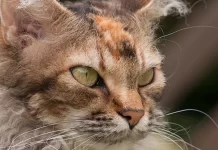Last Updated on August 30, 2023 by Fumipets
Best Cats for People with Allergies
Living with allergies doesn’t mean you have to forgo the joy of having a feline companion. Several cat breeds are known to be more hypoallergenic, producing fewer allergens and causing fewer allergic reactions.
These breeds can be a great choice for individuals and families who adore cats but need to manage their allergy symptoms. Here’s a summary of the best cats for people with allergies, along with answers to some common questions:
Top Hypoallergenic Cat Breeds:
- Siberian: Despite their long fur, Siberians produce fewer allergens due to a unique protein.
- Balinese: These elegant cats have minimal undercoat and are often well-tolerated by allergy sufferers.
- Sphynx: Hairless, Sphynx cats have less fur to shed and fewer allergens overall.
- Russian Blue: Their short, dense coat tends to trap allergens, reducing their spread.
- Cornish Rex: Their curly coat sheds less and produces fewer allergens compared to other breeds.
The Asthma and Allergy Foundation of America estimates that 3 out of 10 persons who suffer allergies or asthma also have sensitivities to dogs and cats.
However, cat allergies are considerably more prevalent, so it’s understandable why so many people are enthusiastic about the concept of hypoallergenic breeds that are claimed to have a certain kind of hair or are less likely to shed.
The particular protein that all cats produce, however, is what you should be worried about if you have a cat allergy, not the fuzzy hair itself, say specialists.
People are allergic to numerous of the proteins that cats excrete, including Fel d 1 through Fel d 7. The most prevalent allergen, Fel d 1, is mostly found in saliva and dander. These tiny proteins cause hives, itching, sneezing, and watery eyes when they are inhaled or come into contact with skin, eyes, or nostrils.
In light of this, the following cat breeds with low allergen and shedding counts may be ideal for allergy sufferers.
The Best Cats for Allergies
Experts advise fostering or visiting with several cat breeds to observe how you respond since everyone interacts differently. Some of the ideal breeds to start with are listed below:
Balinese
Even though he’s a touch fluffy, the clever, vivacious Balinese is often an excellent option for folks with moderate cat allergies since he generates a little less Fel d 1 and has a single layer coat. He will probably be quite vocal since he is a Siamese.
The Javanese, a relative of the Balinese, lacks an undercoat, so he has less hair to groom and will spend more time snuggling. He is highly intelligent, wonderful with kids, and also simple to teach.
Russian Blue
Here’s another stunningly beautiful cat who tests lower on Fel d 1 than cats of other breeds. Despite having a thick, silky coat, a Russian blue doesn’t shed much, thus there is less dander in the air. He also has a cute furry personality, constantly refuting the stereotype of aloof cats.

Siamese
The lovely Siamese is a good option for those who have allergies because of its short, non-shedding coat, which doesn’t need much care. They make up for their lack of grooming requirements with play and energy, so be ready to provide them with lots of toys, exercise, and love for all your other pets.
Siberian
You won’t have to worry too much about sneezing and itching, even though the Siberian’s gorgeous long coat needs brushing throughout the week and sheds a bit more than other cats. Siberian cats are tempting for a variety of reasons, including their low allergen production and playful sweetness.
Cats That Don’t Shed (Much!)
Low-shedding signifies a reduced possibility of irritating airborne Fel d 1 protein particles. To enjoy the companionship of these cats, adequate grooming, a no-cat zone bedroom, and air purifiers could still be required.
Bengal
A Bengal has an oddly short, speckled coat that gives him the appearance of a little wildcat. Because he is highly lively and needs regular attention from his human partners, he doesn’t shed as much as other breeds, which is a positive thing.
Cornish Rex
The friendly, active Cornish rex is available for play whenever and wherever he pleases. He will even fetch! A Cornish rex lacks a coarse layer and has wavy, downy soft fur. He does sometimes need to take a bath to get rid of the oil accumulation, but such baths will also help eliminate Fel d 1 allergens.
Devon Rex

The naughty and cute Devon rex has three coat layers, although his fur is short, wavy, and has very little flyaway hair. He loves to cuddle and is inquisitive and curious.
Korat
Because of their remarkably low shedding glittering blue and silver-tipped coats, the Korats are a suitable option for allergy sufferers. These affectionate lap cats, who are native to Thailand, form close relationships with their families.
LaPerm
LaPerm cats, so named because of their curly coats that may vary from smooth waves to bouncy curls, have a curly coat due to a genetic abnormality. Because of their minimal shedding and resistance to mats, dogs with curly coats could be an excellent choice for allergy sufferers.
Oriental Shorthair
The Oriental shorthair cat purrs a lot because he loves his family and wants to be with them all the time. Although an Oriental’s coat seems smooth and silky to the touch, as long as you give him a regular brushing—which he will enjoy—he doesn’t shed much.
Sphynx
The lovely, vivacious, and wacky Sphynx, who is virtually hairless and a very friendly charmer, is perhaps the closest breed to being hypoallergenic. His suede-like coating does, however, need your assistance to manage skin oil with routine towel rubs and sporadic washes.
Are Certain Cat Breeds Really Hypoallergenic?
Sadly, this definition just isn’t accurate. The more truthful statement is that every individual has a unique allergy threshold. One species of cat could not cause severe reactions in one individual with allergies while causing severe reactions in another person with the same “hypoallergenic” breed if they are sensitive enough. Neutered male cats generate less Fel d 1 than intact male cats, while female cats tend to produce less.
What if you have a serious crush on a certain cat? Before taking your beloved home, ask a veterinarian to check his Fel d 1 protein.
More Tips for Cat Owners with Allergies
Additionally, useful strategies for minimizing allergy responses include diet and grooming. A cat’s body produces less of the allergenic protein when its coat is kept healthy with fish oil or omega-3 fatty acids. Although washing cats presents some difficulties, bathing also reduces the amount of proteins. With the exception of someone who doesn’t have cat allergies, it’s preferable to do this outdoors or with a fine-tooth comb to remove dander and regularly brush the cat’s hair since doing so aerosolizes the proteins.
And if you are in pain? Stop by the drugstore. While researchers are working on hypoallergenic remedies, such as special cat food and medication that lessens the culprit proteins, treating human allergies is simpler.
Antihistamines, hyposensitization therapies, and other treatments make it easier for individuals to live in harmony with cats.
Common Questions:
Are hypoallergenic cats completely allergy-free?
No cat breed is entirely allergy-free, but hypoallergenic breeds produce fewer allergens, minimizing allergic reactions.
What causes cat allergies?
Cat allergies are triggered by proteins found in a cat’s skin cells, urine, and saliva. When these proteins become airborne, they can lead to allergic reactions.
How can I manage allergies if I have a cat?
Regular grooming, frequent cleaning, using air purifiers, and keeping your cat out of certain areas of your home can help manage allergy symptoms.
Can I develop allergies to hypoallergenic cats?
While hypoallergenic cats may be better tolerated, it’s possible to develop allergies to any cat. Spend time with the specific breed you’re considering to gauge your reaction.
Are there non-purebred cats that are hypoallergenic?
Yes, some non-purebred cats might also produce fewer allergens. Individual reactions vary, so spending time with a cat before adoption is crucial.
Choosing a hypoallergenic cat can greatly enhance the quality of life for allergy sufferers who dream of sharing their home with a feline friend.
However, it’s important to note that individual reactions can vary, so spending time with the specific breed you’re considering is a smart step before welcoming a new cat into your life.
With proper care and management, cat lovers can enjoy the companionship of their furry friends while minimizing allergy-related discomfort.
https://www.youtube.com/watch?v=5Wv0wHtYNwk


















